|
|
|
Sort Order |
|
|
|
Items / Page
|
|
|
|
|
|
|
| Srl | Item |
| 1 |
ID:
085661


|
|
|
|
|
| Publication |
2008.
|
| Summary/Abstract |
This paper explores EU policy towards Iran to challenge the common implicit or explicit notion that the EU's 'actorness' in the international system rests primarily, or solely, on its Pillar I external relations. Utilising criteria developed to examine the 'actorness' of the EU, the article explores this policy area to demonstrate that the EU's 'actorness' resulted not only from the 'Community' aspects of foreign policy, but also from its Common Foreign and Security Policy (CFSP).
|
|
|
|
|
|
|
|
|
|
|
|
|
|
|
|
| 2 |
ID:
085477
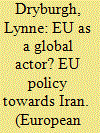

|
|
|
|
|
| Publication |
2008.
|
| Summary/Abstract |
This paper explores EU policy towards Iran to challenge the common implicit or explicit notion that the EU's 'actorness' in the international system rests primarily, or solely, on its Pillar I external relations. Utilising criteria developed to examine the 'actorness' of the EU, the article explores this policy area to demonstrate that the EU's 'actorness' resulted not only from the 'Community' aspects of foreign policy, but also from its Common Foreign and Security Policy (CFSP).
|
|
|
|
|
|
|
|
|
|
|
|
|
|
|
|
| 3 |
ID:
085670
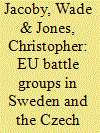

|
|
|
|
|
| Publication |
2008.
|
| Summary/Abstract |
This article fills an important empirical gap concerning a key building block of the EU's Headline Goal 2010, the EU Battlegroups. It asks whether the Battlegroup concept has been robust enough to drive significant changes in two smaller EU member state militaries. We find that it has, though with important qualifications, in the Swedish case, but much less in the Czech case. We stress the importance of linkages between the Battlegroup concept and the prevailing defense reform ideas in each state. We argue that Battlegroup deployment would lead to even greater transformation but that European leaders currently have not faced powerful incentives to deploy the kinds of precise assets the Battlegroups provide. The article also addresses both the fiscal priorities that hamper military readiness and delay deployments and the substantial and enduring gap between word and deed for which EU military efforts have become known.
|
|
|
|
|
|
|
|
|
|
|
|
|
|
|
|
| 4 |
ID:
085675


|
|
|
|
|
| Publication |
2008.
|
| Summary/Abstract |
Civil-military coordination between missions with the same top end of command and belonging to the same organization should increase the effectiveness of both missions even more than in a traditional interaction between military and civilian organizations. Nevertheless, the two EU missions in Bosnia, EUPM and EUFOR, which were both engaged in the fight against organized crime, had to undergo a difficult process until a decent level of cooperation was achieved. The article tries to describe the problems encountered and to address key factors, such as different concepts of operation, problems in the chain of command, a lack of accountability and-most importantly-the human factor, that hampered this cooperation.
|
|
|
|
|
|
|
|
|
|
|
|
|
|
|
|
| 5 |
ID:
085674


|
|
|
|
|
| Publication |
2008.
|
| Summary/Abstract |
This article addresses the question of small states and their future role in any EU armaments policy. It argues that their traditional tactics of demanding equality of membership in armaments organisations, using protectionist tactics to preserve the indigenous defence industry and using their home markets as a method of gaining advantages for their firms, are increasingly failing at the EU level. A combination of their own choices on defence spending, the agreement to allow permanent structured cooperation within the European Defence Agency and the Commission's efforts to liberalise the defence procurement market seem likely to force most small states into the backseat of EU armaments policy-making.
|
|
|
|
|
|
|
|
|
|
|
|
|
|
|
|
| 6 |
ID:
085470
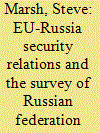

|
|
|
|
|
| Publication |
2008.
|
| Summary/Abstract |
The Kremlin's change of leadership on 7 May 2008 and growing international fears of Russia's resurgence, especially in the aftermath of the Georgian conflict, make this an interesting time to reflect upon EU-Russia security relations. This article does so by examining closely the Survey of Russian Federation Foreign Policy and, one year on from its approval, drawing upon subsequent developments as preliminary corollary or otherwise of its bearing on policy. On balance, it seems that the Kremlin's evolving perception of Russia and international relations has encouraged revised priorities and objectives and a more forceful foreign policy that not only slow progress in filling the Common Spaces, but also increase the likelihood of Russia-EU competition especially in their shared neighbourhood.
|
|
|
|
|
|
|
|
|
|
|
|
|
|
|
|
| 7 |
ID:
085655
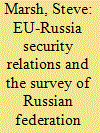

|
|
|
|
|
| Publication |
2008.
|
| Summary/Abstract |
The Kremlin's change of leadership on 7 May 2008 and growing international fears of Russia's resurgence, especially in the aftermath of the Georgian conflict, make this an interesting time to reflect upon EU-Russia security relations. This article does so by examining closely the Survey of Russian Federation Foreign Policy and, one year on from its approval, drawing upon subsequent developments as preliminary corollary or otherwise of its bearing on policy. On balance, it seems that the Kremlin's evolving perception of Russia and international relations has encouraged revised priorities and objectives and a more forceful foreign policy that not only slow progress in filling the Common Spaces, but also increase the likelihood of Russia-EU competition especially in their shared neighbourhood.
|
|
|
|
|
|
|
|
|
|
|
|
|
|
|
|
| 8 |
ID:
085672
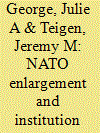

|
|
|
|
|
| Publication |
2008.
|
| Summary/Abstract |
States' conscription policies reveal much about their security climate, economic constraints, political debates, and social norms. While conscription has waned among democratic countries, several states maintain it as a way to socialize and educate their citizens. As post-communist states embrace Western influence and NATO, many have ended compulsory military service. In post-Soviet Georgia, however, conscription policy is a microcosm illustrating the difficulties of bridging security vulnerabilities, political upheaval, and resource realities. Although previous scholarship predicts that security and economic needs should supersede other considerations, we find that the domestic political context looms larger for decision makers of transitioning states
|
|
|
|
|
|
|
|
|
|
|
|
|
|
|
|
| 9 |
ID:
085664


|
|
|
|
|
| Publication |
2008.
|
| Summary/Abstract |
In 2003, the EU was hopeful to convince Iran to give up its nuclear programme. Five years later, most signals point to an accelerated nuclear programme in Iran. This article first aims to sketch an overview of the EU efforts, and secondly to make an interim assessment of the effectiveness of the EU's approach vis- -vis Iran. While the final assessment may be different, the current evaluation is disappointing from the point of view of the EU. The Iranian case does not enhance the EU's strategic reputation in the world.
|
|
|
|
|
|
|
|
|
|
|
|
|
|
|
|
| 10 |
ID:
085476


|
|
|
|
|
| Publication |
2008.
|
| Summary/Abstract |
Drawing on the constructivist concept of 'securitisation', this article analyses Russia's perceptions of, and responses to, Norway's Svalbard policy in the 1990s and 2000s. The analysis focuses on three policy issues which have figured prominently on Russia's arctic security agenda in recent years: (1) the establishment and use of civilian radars and satellite ground stations on the archipelago, (2) the adoption of the Svalbard Environmental Protection Act, and (3) the Norwegian Coast Guard's fishery enforcement measures in the Svalbard Fisheries Protection Zone. The article concludes that despite the changes that have taken place in the Euro-Arctic region after the Cold War, Svalbard has not ceased to be a security concern for Russia.
|
|
|
|
|
|
|
|
|
|
|
|
|
|
|
|
| 11 |
ID:
085659


|
|
|
|
|
| Publication |
2008.
|
| Summary/Abstract |
Drawing on the constructivist concept of 'securitisation', this article analyses Russia's perceptions of, and responses to, Norway's Svalbard policy in the 1990s and 2000s. The analysis focuses on three policy issues which have figured prominently on Russia's arctic security agenda in recent years: (1) the establishment and use of civilian radars and satellite ground stations on the archipelago, (2) the adoption of the Svalbard Environmental Protection Act, and (3) the Norwegian Coast Guard's fishery enforcement measures in the Svalbard Fisheries Protection Zone. The article concludes that despite the changes that have taken place in the Euro-Arctic region after the Cold War, Svalbard has not ceased to be a security concern for Russia.
|
|
|
|
|
|
|
|
|
|
|
|
|
|
|
|
| 12 |
ID:
085657


|
|
|
|
|
| Publication |
2008.
|
| Summary/Abstract |
The arrival of a new US administration in 2009 is a swinging door with respect to opportunities for Russian-American cooperation in strategic nuclear arms reductions and nonproliferation. Both US presidential candidates in 2008 supported nuclear abolition as a theoretically desirable goal, and the Obama administration will certainly pursue nuclear arms reductions consistent with already agreed, or lower, levels. Missile defenses complicate US-Russian relations on this issue, but they pose negotiable, not insurmountable, barriers to further arms reductions and strategic stability.
|
|
|
|
|
|
|
|
|
|
|
|
|
|
|
|
| 13 |
ID:
085474
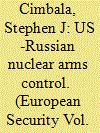

|
|
|
|
|
| Publication |
2008.
|
| Summary/Abstract |
The arrival of a new US administration in 2009 is a swinging door with respect to opportunities for Russian-American cooperation in strategic nuclear arms reductions and nonproliferation. Both US presidential candidates in 2008 supported nuclear abolition as a theoretically desirable goal, and the Obama administration will certainly pursue nuclear arms reductions consistent with already agreed, or lower, levels. Missile defenses complicate US-Russian relations on this issue, but they pose negotiable, not insurmountable, barriers to further arms reductions and strategic stability.
|
|
|
|
|
|
|
|
|
|
|
|
|
|
|
|
| 14 |
ID:
085669


|
|
|
|
|
| Publication |
2008.
|
| Summary/Abstract |
The NRF and the EU BG were launched to enable NATO and the EU respectively to shed some of their Cold War roles and begin to incorporate new organisational functions as means to meet their members' needs in a changing global security environment. However, since their launch the two rapid reaction forces have both failed to fully consolidate. Our argument is that an examination of intra-NATO/EU contested identities at three levels (supra-state, state and sub-state) provides us with additional insights for the lack of success in consolidating the two sets of rapid reaction forces.
|
|
|
|
|
|
|
|
|
|
|
|
|
|
|
|
|
|
|
|
|